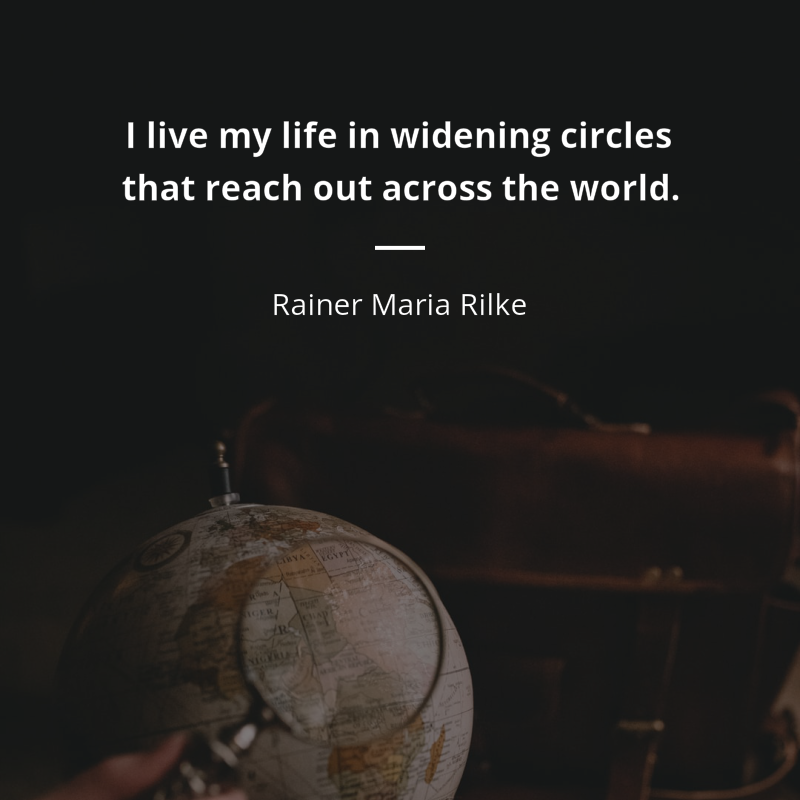Obras
Letters to a Young Poet
Rainer Maria RilkeSonnets to Orpheus
Rainer Maria RilkeRainer Maria Rilke Frases famosas
Letters to a Young Poet
Citações de amor de Rainer Maria Rilke
“Amor: duas solidões protegendo-se uma à outra.”
der Liebe, die darin besteht, daß zwei Einsamkeiten einander schützen
Briefe an einen jungen Dichter - Página 42, Rainer Maria Rilke, Franz Xaver Kappus - Insel-Verlag, 1932 - 54 páginas
Fonte: RILKE, Rainer Maria. Cartas a um Jovem Poeta. Trad. Paulo Rónai. 10. ed. Porto Alegre: Editora Globo, 1980
Lieben ist zunächst nichts, was aufgehen, hingeben und sich mit einem Zweiten vereinen heißt (denn was wäre eine Vereinigung von Ungeklärtem und Unfertigem, noch Ungeordnetem -?), es ist ein erhabener Anlaß für den einzelnen, zu reifen
Briefe an einen jungen Dichter - Página 39, Rainer Maria Rilke - nsel-Verlag, 1949 - 55 páginas
Rainer Maria Rilke frases e citações
Cartas a Um Jovem Poeta
“Outra coisa é o verdadeiro canto. Um sopro ao nada. Um vôo em Deus. Um vento.”
In Wahrheit singen, ist ein andrer Hauch. Ein Hauch um nichts. Ein Wehn im Gott. Ein Wind.
Die Sonette an Orpheus, Insel-Bücherei Nr. 115 - página iii, de Rainer Maria Rilke, Editora Insel-verlag, 1923, 63 páginas
“Rosa, ó pura contradição, volúpia/ de ser o sono de ninguém sob tantas/ pálpebras.”
Rainer Maria Rilke, citado em "Estrêla da vida inteira: poesias reunidas" - Página 414, Manuel Bandeira - J. Olympio, 1966 - 487 páginas
Uncollected Poems
Rainer Maria Rilke: Frases em inglês
“Let everything happen to you: beauty and terror. Just keep going. No feeling is final.”
from poem Go to the Limits of Your Longing.
Appears in movie Jojo Rabbit.
Variante: Let everything happen to you
Beauty and terror
Just keep going
No feeling is final
“Have patience with everything that remains unsolved in your heart.
… live in the question.”
Fonte: Letters to a Young Poet
Letter One (17 February 1903)
Letters to a Young Poet (1934)
Contexto: No one can advise or help you — no one. There is only one thing you should do. Go into yourself. Find out the reason that commands you to write; see whether it has spread its roots into the very depths of your heart; confess to yourself whether you would have to die if you were forbidden to write.
Letter Three (23 April 1903)
Letters to a Young Poet (1934)
First Elegy (as translated by Stephen Mitchell)
Fonte: Duino Elegies (1922)
Contexto: Who, if I cried out, would hear me among the angels'
hierarchies? and even if one of them
pressed me against his heart: I would be consumed
in that overwhelming existence. For beauty is nothing
but the beginning of terror, which we still are just able to endure,
and we are so awed because it serenely disdains
to annihilate us. Every angel is terrifying.
“You, Beloved, who are all
the gardens I have ever gazed at,
longing.”
You Who Never Arrived, as translated by Stephen Mitchell
Contexto: You, Beloved, who are all
the gardens I have ever gazed at,
longing. An open window
in a country house —, and you almost
stepped out, pensive, to meet me.
Streets that I chanced upon,—
you had just walked down them and vanished.
And sometimes, in a shop, the mirrors
were still dizzy with your presence and, startled,
gave back my too-sudden image. Who knows?
perhaps the same bird echoed through both of us
yesterday, separate, in the evening...
Letter Seven (14 May 1904)
Letters to a Young Poet (1934)
Contexto: People have (with the help of conventions) oriented all their solutions toward the easy and toward the easiest side of the easy; but it is clear that we must hold to what is difficult; everything alive holds to it, everything in Nature grows and defends itself in its own way and is characteristically and spontaneously itself, seeks at all costs to be so and against all opposition. We know little, but that we must hold to what is difficult is a certainty that will not forsake us; it is good to be solitary, for solitude is difficult; that something is difficult must be a reason the more for us to do it.
To love is good, too: love being difficult. For one human being to love another: that is perhaps the most difficult of all our tasks, the ultimate, the last test and proof, the work for which all other work is but preparation.
“When you go to bed, don't leave bread or milk
on the table: it attracts the dead.”
Sonnet 6 (as translated by Edward Snow)
Sonnets to Orpheus (1922)
Fonte: Translations from the Poetry of Rainer Maria Rilke
Letter Seven (14 May 1904)
Letters to a Young Poet (1934)
Variante: For one human being to love another human being: that is perhaps the most difficult task that has been given to us, the ultimate, the final problem and proof, the work for which all other work is merely preparation.
Fonte: The Selected Poetry of Rainer Maria Rilke
Contexto: People have (with the help of conventions) oriented all their solutions toward the easy and toward the easiest side of the easy; but it is clear that we must hold to what is difficult; everything alive holds to it, everything in Nature grows and defends itself in its own way and is characteristically and spontaneously itself, seeks at all costs to be so and against all opposition. We know little, but that we must hold to what is difficult is a certainty that will not forsake us; it is good to be solitary, for solitude is difficult; that something is difficult must be a reason the more for us to do it.
To love is good, too: love being difficult. For one human being to love another: that is perhaps the most difficult of all our tasks, the ultimate, the last test and proof, the work for which all other work is but preparation.

“I live my life in widening circles that reach out across the world.”
Fonte: Rilke's Book of Hours: Love Poems to God
“The work of the eyes is done. Go now and do the heart-work on the images imprisoned within you.”
Wendung (Turning Point), as translated by Stephen Mitchell
As quoted in Sunbeams : A Book of Quotations (1990) by Sy Safransky, p. 42
“Ah, how good it is to be among people who are reading.”
Fonte: The Notebooks of Malte Laurids Brigge
